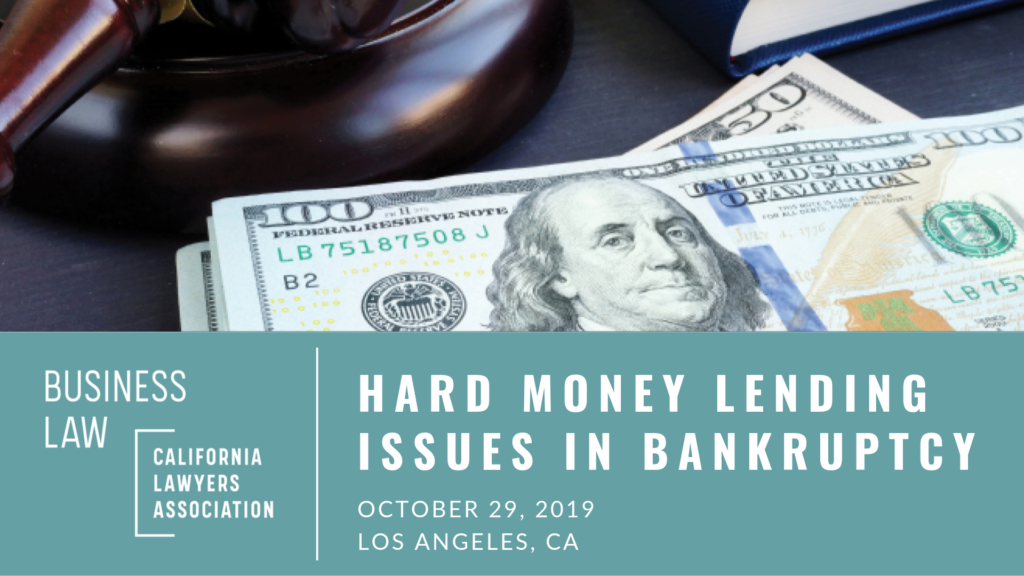If you find yourself in the position of needing a hard money loan but worry about your recent bankruptcy affecting your chances, this article will provide you with valuable insights. Discover whether it is possible to secure a hard money loan, even with a recent bankruptcy on your record. Gain a deeper understanding of the factors lenders consider when evaluating loan applications and learn how you can maximize your chances of obtaining the financing you need. Explore the potential solutions available to you and make an informed decision about pursuing a hard money loan in light of your recent bankruptcy.

What is a Hard Money Loan?
Definition
A hard money loan is a type of short-term, asset-based financing that is typically secured by real estate. Unlike traditional bank loans, hard money loans are funded by private investors or lending companies, known as hard money lenders. These loans are often used by borrowers who may not qualify for traditional financing or need quick access to funds.
Purpose
The purpose of a hard money loan is to provide borrowers with fast and flexible financing options. They are commonly used for real estate investments, fix-and-flip projects, construction projects, and other time-sensitive opportunities. Since hard money lenders focus more on the value of the collateral rather than the borrower’s creditworthiness, these loans can be a viable option for individuals who have experienced financial setbacks, such as bankruptcy.
Benefits
There are several benefits of obtaining a hard money loan, particularly for individuals with recent bankruptcies.
-
Fast Approval: Hard money loans are known for their quick approval process, allowing borrowers to secure funds within days or weeks instead of months.
-
Collateral Based: Hard money lenders primarily evaluate the value and equity of the property offered as collateral, rather than solely relying on the borrower’s credit history or income. This makes them more willing to work with individuals who have experienced bankruptcy or other financial difficulties.
-
Flexible Terms: Hard money loans offer more flexibility in terms of repayment options, allowing borrowers to tailor the loan structure to their specific needs. This can be especially advantageous for those who have recently gone through bankruptcy and need a loan that aligns with their financial recovery plan.
Effects of Bankruptcy on Loan Approvals
Traditional Lenders
When it comes to conventional lenders such as banks or credit unions, bankruptcy can have a significant impact on loan approvals. Most traditional lenders have strict guidelines and credit score requirements that must be met in order to qualify for a loan. Bankruptcy is generally viewed as a red flag, signaling potential financial instability and an increased risk of default. As a result, individuals with recent bankruptcies may face difficulties in securing loans from these lenders.
Hard Money Lenders
Hard money lenders, on the other hand, may be more lenient when considering loan applications from individuals with recent bankruptcies. Since these lenders primarily focus on the value of the collateral, they are often more willing to overlook past financial setbacks. While bankruptcy may still be a factor in their evaluation process, it may not carry as much weight as it would with traditional lenders. However, it’s important to note that each hard money lender has different criteria and policies, so approval is not guaranteed.
Factors Considered by Hard Money Lenders
Equity Collateral
One of the primary factors considered by hard money lenders is the equity collateral provided by the borrower. Equity collateral refers to the value and ownership stake that the borrower has in the property offered as security. Hard money lenders typically require a certain level of equity in the collateral to mitigate their risk. The more equity the borrower has, the more likely they are to be approved for a hard money loan, even with a recent bankruptcy.
Loan-to-Value Ratio
The loan-to-value (LTV) ratio is another important factor that hard money lenders take into account. The LTV ratio represents the percentage of the property’s value that the lender is willing to lend. A lower LTV ratio indicates a lower level of risk for the lender, as they have a higher level of equity to recoup in the event of default. While specific LTV requirements vary among lenders, a higher LTV ratio can improve the chances of loan approval for individuals with recent bankruptcies.
Exit Strategy
Hard money lenders also consider the borrower’s exit strategy, which outlines how the loan will be repaid. A well-defined and viable exit strategy demonstrates to the lender that the borrower has a clear plan for repaying the loan, reducing the risk of default. The exit strategy may include selling the property, refinancing with a traditional lender, or other means of generating the necessary funds. Having a solid exit strategy can help individuals with recent bankruptcies increase their chances of approval.
1. Time Since Bankruptcy
Recent Bankruptcy
If you have a recent bankruptcy on your record, it can impact your ability to obtain a hard money loan. Hard money lenders typically prefer to see a certain period of time elapse since the bankruptcy discharge before considering an application. The exact timeframe varies among lenders, but a common requirement is a minimum of one to two years since the bankruptcy discharge. During this period, it is crucial to focus on rebuilding your credit, establishing financial stability, and demonstrating responsible financial behavior.
Discharged Bankruptcy
On the other hand, if your bankruptcy has already been discharged for a considerable period of time, your chances of obtaining a hard money loan may be higher. Lenders are often more willing to work with borrowers who have a discharged bankruptcy in their past, as it demonstrates a willingness to resolve past financial difficulties. However, other factors such as credit score, equity collateral, and income will still be taken into consideration when evaluating your loan application.

2. Credit Score and History
Credit Score
While hard money lenders may be more lenient than traditional lenders when it comes to credit history, your credit score still plays a role in the loan approval process. A higher credit score can increase your chances of being approved for a hard money loan, even with a recent bankruptcy. Lenders typically look for a minimum credit score requirement, which varies depending on the specific lender and the loan amount requested. It is important to review and improve your credit score before applying for a hard money loan to maximize your chances of approval.
Credit History
In addition to your credit score, hard money lenders also consider your credit history. They will review your credit report to assess your financial behavior and determine if you have a pattern of responsible financial management. While a bankruptcy may be a negative mark on your credit history, it is not the sole determining factor. Demonstrating positive credit behavior after the bankruptcy, such as timely payments and responsible credit utilization, can help mitigate the impact of the bankruptcy and improve your chances of loan approval.
3. Ability to Provide Collateral
Types of Collateral
Collateral is a crucial aspect of a hard money loan, as it serves as security for the lender in case of default. Hard money lenders typically accept various types of collateral, including residential or commercial properties, land, or other real estate assets. The specific type of collateral accepted may vary among lenders, so it is important to discuss this with potential lenders. If you have valuable collateral to offer, it can increase your chances of approval, even with a recent bankruptcy on your record.
Collateral Valuation
The value of the collateral is another important factor considered by hard money lenders. Lenders will conduct a thorough appraisal or evaluation of the property to determine its current market value. The higher the value of the collateral, the more favorable it is for loan approval. However, it is important to note that lenders typically lend a percentage of the collateral’s value, known as the loan-to-value ratio. This means that even if the collateral has a high value, you may not be able to borrow the full amount. Understanding the collateral valuation process can help you assess your chances of loan approval.

4. Loan-to-Value Ratio
Determining LTV Ratio
The loan-to-value (LTV) ratio is a critical factor that hard money lenders consider when evaluating loan applications. The LTV ratio represents the percentage of the property’s value that the lender is willing to lend. To determine the LTV ratio, lenders typically divide the loan amount by the appraised value of the property. For example, if a property is appraised at $200,000 and the lender is willing to lend 70% of the value, the loan amount would be $140,000 (70% of $200,000). Understanding how lenders calculate the LTV ratio can help you assess your chances of loan approval.
Acceptable LTV Ratios
Hard money lenders have varying acceptable LTV ratios, depending on their risk tolerance and lending policies. While some lenders may be willing to lend up to 90% of the appraised value, others may have a maximum LTV ratio of 70% or lower. The specific LTV requirement may also depend on other factors such as credit score, income, and the borrower’s overall financial profile. For individuals with recent bankruptcies, it may be more challenging to obtain a high LTV ratio, as lenders may want to mitigate their risk by lending a lower percentage of the collateral’s value.
5. Income and Financial Stability
Proof of Income
Income and financial stability are important factors that hard money lenders consider when evaluating loan applications. While hard money loans are often collateral-based, lenders still want to ensure that borrowers have the means to repay the loan. Providing proof of income, such as pay stubs, tax returns, or financial statements, can help demonstrate your ability to make loan payments. Even if you have a recent bankruptcy on your record, having a steady and verifiable source of income can increase your chances of loan approval.
Debt-to-Income Ratio
In addition to income, hard money lenders evaluate the borrower’s debt-to-income (DTI) ratio. The DTI ratio measures the percentage of a borrower’s income that is used to repay debt obligations. Lenders typically prefer a lower DTI ratio, as it indicates a lower level of financial strain and a higher likelihood of being able to make loan payments. While the acceptable DTI ratio may vary among lenders, it is generally advisable to keep your DTI ratio as low as possible to enhance your chances of loan approval, especially if you have a recent bankruptcy.

6. Exit Strategy
Clear Action Plan
Having a clear and well-defined exit strategy is crucial when applying for a hard money loan, especially if you have a recent bankruptcy. An exit strategy outlines how you plan to repay the loan and ensure that the lender’s investment is secured. Ideally, your exit strategy should include a specific timeframe for selling the property or refinancing with a traditional lender. Providing a clear action plan demonstrates to the lender that you have a solid plan in place to repay the loan, increasing your chances of approval.
Repayment Sources
In addition to a clear action plan, hard money lenders also evaluate the sources of repayment. They want to ensure that you have multiple avenues to generate the necessary funds to repay the loan. This can include income from employment, rental income from the property, or other sources of revenue. By showcasing diverse repayment sources, you can alleviate concerns about your ability to repay the loan, even with a recent bankruptcy.
Steps to Increase Approval Chances
1. Rebuild Credit
Rebuilding your credit after a bankruptcy is crucial to increase your chances of loan approval. This involves taking steps to improve your credit score, such as paying bills on time, reducing debt, and managing credit responsibly. Additionally, reviewing your credit report regularly and addressing any errors or inaccuracies can help improve your creditworthiness. By demonstrating responsible credit behavior and improving your credit score, you can enhance your chances of obtaining a hard money loan.
2. Build a Strong Portfolio
Building a strong portfolio can help you showcase your experience and expertise in real estate. This can include providing details about past successful projects, property investments, or any other relevant experience. A strong portfolio demonstrates to the lender that you have a track record of managing real estate assets and increases their confidence in your ability to handle the loan responsibly. Having a solid portfolio can be particularly beneficial for individuals with recent bankruptcies, as it shows that you have the necessary skills and knowledge to make the project a success.
3. Seek Professional Guidance
Navigating the hard money loan approval process can be complex, especially if you have a recent bankruptcy on your record. Seeking professional guidance from a reputable financial advisor, mortgage broker, or real estate attorney can provide valuable insight and assistance. These professionals can help you assess your financial situation, review your options, and guide you through the loan application process. Their expertise can increase your chances of obtaining a hard money loan and ensure that you make informed decisions throughout the process.
In conclusion, obtaining a hard money loan with a recent bankruptcy on your record is possible, but it requires careful consideration of various factors. While traditional lenders may be less willing to work with individuals who have experienced bankruptcy, hard money lenders may offer more flexibility and options. By understanding the factors that hard money lenders consider, such as equity collateral, credit score, income, and exit strategy, you can assess your chances of loan approval and take steps to improve your eligibility. Rebuilding your credit, building a strong portfolio, and seeking professional guidance can significantly increase your chances of obtaining a hard money loan, despite a recent bankruptcy.




